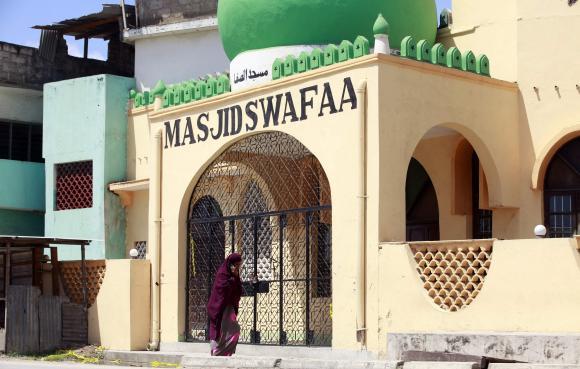Mombasa Deserted Mosques

"They cannot stop us from praying especially this Friday. We will go in there, whether they like it or not," a youth who identified himself as Osama, told Reuters on Friday, November 21.
Osama was one of hundreds of Muslims who demanded access to the city mosques amid police crackdown.
Over the last week, hundreds of heavily-armed paramilitary police descended on Musa, Sakina, Swafaa and Minaa mosques in Mombasa and arrested hundreds of youths.
They have also accused Muslim youths in the mosques of fuelling insecurity incidences, such as assassinations of people working with the government in its counterterrorism activities.
Police claimed that the mosque raids yielded an assortment of weapons in the mosques, a claim that was rejected by many Muslims in Kenya.
On Friday, several mosques in the coastal city remained closed by the police who denied Muslim entry for Friday prayers.
Many businesses owned by Muslims and non-Muslims were shut down too after clashes between police and Muslim youths.
Outraged by mosques closures, Muslim leaders described police tactic as "counterproductive", saying it has made Muslims in Kenya feel as being unfairly targeted in the name of fighting terrorism.
“What the police is doing is like taking a cat and pushing it against the wall. If you do that, the cat will revolt,” Mvita MP Abdulswamad Nassir told Standard Digital on Saturday, November 22.
Community leaders have also warned that that the extreme action taken by police in raiding mosques and arresting hundreds of youth will result in radicalizing many Muslims.
“If you close mosques you invite the sympathy of those who are not with the militants,” Kisauni MP Rashid Bedzimba said.
Unconstitutional
Deploring security’s failure to contain the situation, Nairobi legislators warned that mosques’ closure is "unconstitutional", urging the government to engage them in tackling radicalization.
“The closure of mosques is contrary to the constitution, which provides for the freedom to worship," said Mandera Senator Billow Kerrow.
"As leaders, we are concerned with the government’s actions targeting places of worship.
“Profiling of youth, leaders and now mosques appears to not yield any fruit, no solution is forthcoming, It is high time the government brought us on board. Using might is not the best way to address the security challenges.”
Pointing to the rights of detainees, several lawmakers have called on the government to review its policy with terror suspects.
“The government should change its policies as its present action amounts to profiling the community," Senator Hassan said.
“The constitution guarantees rights to suspects and the rest of the public. Rounding up and detaining suspects over the 24 hours is infringing on their rights,” Hassan argued.
Kenya Muslims have been sensing eradication of their rights after their country was involved in the so-called war on terrorism in East Africa.
Supported by UK and US, Kenya's anti-terror police have been accused of targeting innocent Muslims with arbitrary arrests and disappearances.
Muslims problems increased following last September Westgate mall attack in which more than 60 people were killed, the attack which was claimed by Somalia's militant al Shabaab group.
Source: On Islam



